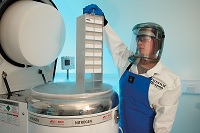 |
| Fujifilm opened a cell-banking facility with an eye toward expansion.--Courtesy of Fujifilm |
Fujifilm has been expanding its biologics manufacturing capacity ever since it jumped into the business two years ago by picking up a couple of plants from Merck & Co. ($MRK).
The company said Monday it has opened a cell-banking facility at the former Merck plant in Billingham, U.K., which it will use for projects there as well as at the former Merck biologics plant in Research Triangle Park, NC. It is also expanding its mammalian cell manufacturing capacity in the U.K. with a project that is set to be finished in the final quarter of this year.
Bridget Hall, communications manager for Fujifilm Diosynth Biotechnologies UK, said in an interview that she was unable to give the exact investment amount in the new plant, but she said that it was in the tens of millions of dollars. The Billingham plant already has microbial fermentation capabilities, "so this gives us a foothold in the mammalian cell business as well," Hall told FiercePharmaManufacturing. The North Carolina plant has both capabilities.
The expansion in Billingham is primarily built around single-use technology and includes 200-liter and 1000-liter single-use bioreactors. A 2000-liter bioreactor is planned for 2014. Hall said an expansion on the development and process side last year means some of the work will be handled by existing workers but that 15 to 20 new jobs are being added in manufacturing. She said since the facility is being built from scratch, it incorporates "all of the latest single-use technology. This is a very exciting time for us."
Fuji paid a reported $490 million in February 2011 to buy the Merck BioManufacturing Network and its biologics plants in North Carolina and Northeast England. Merck wanted out of the biologics contract manufacturing business, although it has maintained biologics manufacturing capabilities and just inked a partnership deal with the South Korean conglomerate Samsung and Biogen Idec ($BIIB) to develop biosimilars.
The Japanese company has been beefing up in medicine and pharma, two businesses the company has targeted in an attempt to counterbalance falling demand for its photo products. Fujifilm in October signed up India's Piramal to help develop and manufacture antibody drug conjugates, or ADCs, a type of targeted therapy that combines a specific anticancer antibody or antibody fragment linked to a potent anticancer therapeutic. With more targeted drugs being developed, that has been a growing area among contract manufacturers. Hall said that deal with Piramal "is all part of the same" effort to build its presence in biologic manufacturing.
- here's the release
Editor's note: The story was updated to include details provided by Bridget Hall, communications manager for Fujifilm Diosynth Biotechnologies UK.